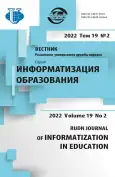Features, experience and benefits of implementing STEAM technology in the main school
- Авторлар: Semenova D.A.1
-
Мекемелер:
- Moscow City University
- Шығарылым: Том 19, № 2 (2022)
- Беттер: 146-156
- Бөлім: EVOLUTION OF TEACHING AND LEARNING THROUGH TECHNOLOGY
- URL: https://journal-vniispk.ru/2312-8631/article/view/321315
- DOI: https://doi.org/10.22363/2312-8631-2022-19-2-146-156
- ID: 321315
Дәйексөз келтіру
Толық мәтін
Аннотация
Problem statement. The educational life of the modern school is a huge field for observation and analysis. A variety of technologies used in the world to enhance cognitive activity and increase the role of independence in the activities of students create new forms and methods within the educational process. STEAM technologies are actively used in the system of additional education. However, the use of such technology in the main educational process has not been practically studied. This is due to the difficulty of combining innovative approaches with the implementation of the school curriculum. Methodology. The study uses methods for designing a learning model, pedagogical experiment, observation, conversation, and experience generalization. Content analysis and thematic monitoring of existing publications were carried out for the keywords, such as STEAM-technologies, increase of cognitive activity, and creation of educational laboratories. Results. The three-year experience of experimental application of educational STEAM-technology in the primary school is considered in order to analyze and highlight the most significant examples of the application of this technology for practice. The essence and features of the educational STEAM technology are described, as well as the ways of creating educational laboratories based on the proposed approaches implemented within the framework of the study. Significant aspects of the use of such technology in the modern school are revealed. Examples from the practice of school work are given, types of laboratories, goals and content of training, and obtained educational results are considered. Conclusion. In the process of performing research work using STEAM technology in the educational process of the secondary school, the most effective ways to create educational laboratories and the most significant aspects of the use of such technology in school were identified.
Негізгі сөздер
Авторлар туралы
Daria Semenova
Moscow City University
Хат алмасуға жауапты Автор.
Email: SemenovaD@mgpu.ru
ORCID iD: 0000-0002-3709-9804
Candidate of Pedagogical Science, senior lecturer, Musical Department of Musical Art, Institute of Сulture and Arts
29 Maria Ulyanova St, Moscow, 119331, Russian FederationӘдебиет тізімі
- Alekseev NG, Leontovich AV, Obuhov AS, Fomina LF. The concept of the development of research activities of students. Issledovatel’skaja Rabota Shkol’nikov. 2002;(1): 24–33. (In Russ.)
- Sorokina TE. From STEM to STEAM-education through the Scratch software environment. Modern Information Technologies and IT Education. 2015;2(11):362–366. (In Russ.)
- Byars-Winston A, Lund Dahlberg M. (eds.) The science of effective mentorship in STEMM 2019. Washington DC: The National Academies Press; 2019. https://doi.org/10.17226/25568
- Ejiwale JA. Barriers to successful implementation of PDM. Journal of Education and Learning. 2013;7(2):63–74.
- Konjushenko SM, Zhukova MS, Mosheva EA. STEM vs STEAM education: changing the understanding of how to teach. Proceedings of the Baltic State Academy of the Fishing Fleet: Psychological and Pedagogical Sciences. 2018;(2(44)):99–103. (In Russ.)
- Honey M, Pearson G, Schweingruber H. (eds.) STEM integration in K-12 Education 2014: status, prospects, and an agenda for research. Washington, DC: The National Academies Press; 2014. https://doi.org/10.17226/18612
- Obukhov AS. (ed.) Scientific and practical education, research training, STEAM education: new types of educational situations: collection of reports of the IX International Scientific and Practical Conference “Research Activity of Students in the Modern Educational Space” (vol. 1). Moscow; 2018. (In Russ.)
- Yakman G. STEAM – an educational framework to relate things to each other and reality. Independent International K12 Educational Portal and Magazine. Available from: https://steamedu.com/wp-content/uploads/2020/02/K12Digest2019.pdf (accessed: 12.12.2019).
- Uvarov AJu. Research approach in teaching natural sciences abroad. In: Obukhov AS. (ed.) Scientific and practical education, research training, STEAM education: new types of educational situations: collection of reports of the IX International Scientific and Practical Conference “Research Activity of Students in the Modern Educational Space” (vol. 1). Moscow; 2018. p. 34–54. (In Russ.)
- Morozova OV, Dukhanina ES. STEAM technologies in children’s additional education. Balandinsky Readings 2019. 2019;XIV:553–556. (In Russ.) Available from: https://cyberleninka.ru/article/n/steam-tehnologii-v-dopolnitelnom-obrazovanii-detey/viewer (accessed: 03.02.2022).
- Frumin ID, Dobrjakova MS, Barannikov KA, Remorenko IM. Universal competencies and new literacy: what to teach today for success tomorrow. Preliminary conclusions of the international report on trends in the transformation of school education. Sovremennaja Analitika Obrazovanija. 2018;(2(19)). Moscow: NIU VShJe Publ. (In Russ.)
- Grinshkun VV. Problems and ways of effective use of informatization technologies in education. Bulletin of Moscow University. Series 20: Pedagogical Education. 2018; (2):34–47. (In Russ.)
- Cakir M. Constructivist approaches to learning in science and their implications for science pedagogy: A literature review. International Journal of Environmental & Science Education. 2008;(3(4)):193–206. Available from: http://cepa.info/3848 (accessed: 05.03.2018).
- Buczinsky S, Ireland C, Reed S, Lacanienta E. Communicating science concepts through art. 21st-centure skills and practice. Available from: https://34co0u35pfyt37c0y0457xcu-wpengine.netdna-ssl.com/wp-content/uploads/2015/09/scienceart.pdf (accessed: 03.02.2022).
Қосымша файлдар









